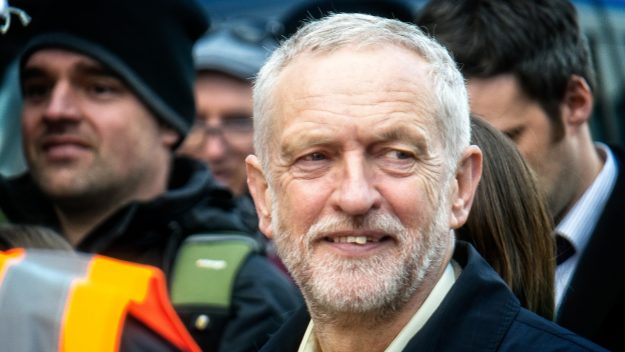Monday saw a momentous shift in Labour policy with a move towards a people’s vote on Brexit, but can we really trust Corbyn? Asks Will Sayner.

Jeremy Corbyn, the millennial messiah, has relentlessly set out to right the wrongs of a government pursuing a completely unnecessary policy leading to the ruin of an entire country. Yes, he’s been merciless in his pursuit of apologies for the Iraq War, it’s just a shame he’s been so lukewarm on Brexit.
Sixteen years ago today, we marched against the Iraq war. pic.twitter.com/RvicYirnTI
— Jeremy Corbyn (@jeremycorbyn) 15 February 2019
Not to say the Iraq War wasn’t a terrible mistake, nor to flippantly compare a conflict that led to the death of nearly half a million people with a simple act of economic suicide, but it seems strange that Corbyn is still so obsessed with the war and yet has only just seemed to comprehend the crisis we currently face.
Corbyn voted against joining the EU, but campaigned fiercely to remain a part of it. Well, maybe not campaigned, but he certainly attended meetings about it! Yes, rest-assured Remainers, he certainly attended meetings.
The sandaled saviour of the under-25s has spent more time protesting that he really does want to remain in the EU, rather than genuinely protesting against leaving it.
Unfortunately, actions speak louder than words.

In June 2017 a rebel amendment was put before parliament calling for Britain to stay in the single market and customs union. Not only did Corbyn whip his party to vote against it, but he sacked three ministers from the shadow cabinet for defying him while a fourth quit. The motion, proposed by Chuka Umunna, also stated that Britain should not leave the EU if we failed to reach a deal. Forty-nine labour MPs rebelled in total, but the amendment was also backed by the Lib Dems, Greens, SNP, and Plaid Cymru.
Sadly, Mr. “for the many and not the few” doesn’t like working with many colleges. The left-leaning parties of Westminster have routinely tried to get the primary opposition on board the anti-Brexit train, but Corbyn couldn’t be persuaded. On 8 January, 2018, Corbyn snubbed the other leaders’ invitation to join their cross-party meeting on how to coordinate efforts to stay in the single market, scorning their idea of staying in “the membership club” of the single market: a form of elitism that doesn’t seem to sit well with his socialist sensibilities. In response, Ian Blackford, the SNP leader at Westminster, accused Corbyn of failing to show, “Any leadership whatsoever,” on “The single biggest issue facing the country…”
@jeremycorbyn refusing to meet with other opposition parties next week to co-ordinate how we can all work together to keep us in the single market and customs union. If we all work together we can protect jobs, prosperity and workers rights. He will be empty chaired.
— Ian Blackford (@IanBlackfordMP) 6 January 2018
Corbyn wasn’t content creating tensions with other parties, he had to weed out the Remainers from his own ranks, lest someone actually stand up to the Tories. On 23 March, 2018, shadow Northern Ireland secretary Owen Smith was sacked by Corbyn for calling for a referendum on the final terms of the withdrawal agreement. Incidentally, it was Smith who ran against Corbyn for the Labour leadership in 2016 on a fiercely pro-EU platform, and one has to wonder what might have happened if the cult of Corbyn hadn’t created so much momentum.
Its extraordinary that a shadow cabinet member -doing an excellent job in their brief – should be sacked for standing up for our principles and advocating a Brexit policy that commands the overwhelming support of our members, supporters and voters. What has happened to our party? https://t.co/DBYDlNXSZ0
— Chuka Umunna (@ChukaUmunna) 23 March 2018
Corbyn has been dragged, kicking and screaming, into action. On 25 September, 2018, Labour voted on whether to support a referendum on the final terms of Brexit at their Liverpool party conference. It had been long-established that the majority of Labour voters supported the move, but it wasn’t until the conference that Corbyn accepted that he was, “Bound by the democracy of our party.” Less than a month later, he stated it was only, “An option for the future.”
Corbyn was trying to exhaust all other options. Even when May survived the vote of no confidence, destroying Jeremy’s snap election dreams, his spokespeople insisted that a second referendum was not the default option. Once again, Blackford, Lib Dem Leader Vince Cable, Liz Saville-Roberts of Plaid Cymru and the Greens’ Caroline Lucas wrote a joint letter to Corbyn, urging him to join them in a cross-party united front, which was once again ignored.
.@IanBlackfordMP has joined with other opposition party leaders to call on Labour and Jeremy Corbyn to finally get off the fence and support a #PeoplesVote.
The SNP will not stand by and watch as Tory recklessness & Labour inaction threatens to drag Scotland out of the EU. pic.twitter.com/DXP7IbPMb9
— The SNP (@theSNP) 16 January 2019
Having failed to turn this situation to his advantage, Corbyn announced this week that Labour would back a people’s vote on the final terms of Brexit: finally falling off the fence at the very last minute. Ironic, given that only this week he accused May of, “Running down that clock,” on Brexit, when his own policy was literally to exhaust all other options before making any kind of Brexit-specific stand.
Many on the left would argue that Boris Johnson, one of Brexit’s initial architects, helped to bring about this mess simply to further his own political standing. Is Corbyn any different? He refused to take any action on the country’s most pressing issue, even blocking the action of others, in attempt to turn the situation to his personal advantage.
After tonight’s votes in parliament, we’ll continue to push for a close economic relationship based on our credible alternative plan or a General Election.
We’ll also back a public vote in order to prevent a damaging Tory Brexit or disastrous No Deal. pic.twitter.com/gFjQfeE3LD
— Jeremy Corbyn (@jeremycorbyn) 27 February 2019
In all likelihood, the recent eight MP split from Labour may have helped guide Corbyn’s hand toward action, as he realised his indifference and single-minded stubbornness is not shared by the whole Labour party. In fact, it may only be matched by that of our current PM, as both seem completely set on pushing their own agendas, with little regard for how many people oppose them or the damage they’re doing to the country.
If you like the EU, remember all that Corbyn wouldn’t do. When the next general election comes, remember Corbyn can’t be trusted. You may not think Tory policy is right, but Labour is not the only option we’re left with.
